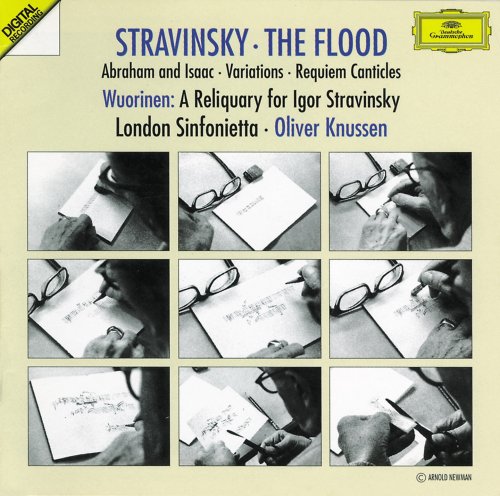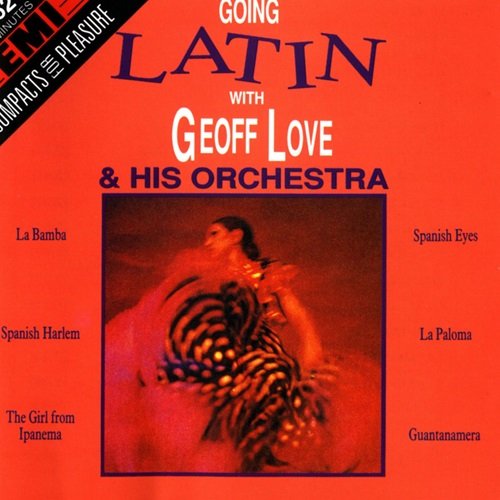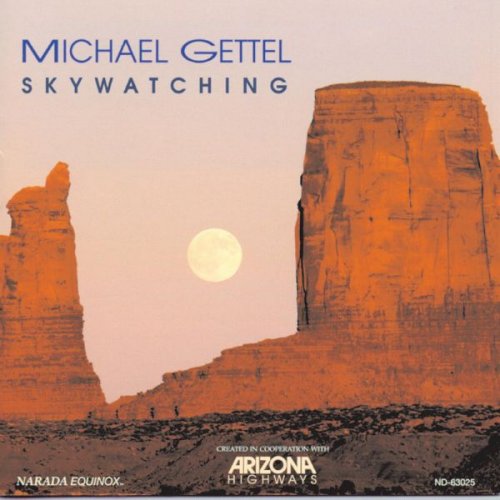London Sinfonietta, Oliver Knussen - Stravinsky: The Flood, Abraham and Isaac, Variations;, Requiem Canticles / Wuorinen: A Reliquary for Igor Stravinsky (1995)

Artist: London Sinfonietta, Oliver Knussen
Title: Stravinsky: The Flood, Abraham and Isaac, Variations;, Requiem Canticles / Wuorinen: A Reliquary for Igor Stravinsky
Year Of Release: 1995
Label: Deutsche Grammophon
Genre: Classical
Quality: FLAC (tracks)
Total Time: 01:09:09
Total Size: 313 mb
WebSite: Album Preview
Tracklist:Title: Stravinsky: The Flood, Abraham and Isaac, Variations;, Requiem Canticles / Wuorinen: A Reliquary for Igor Stravinsky
Year Of Release: 1995
Label: Deutsche Grammophon
Genre: Classical
Quality: FLAC (tracks)
Total Time: 01:09:09
Total Size: 313 mb
WebSite: Album Preview
The Flood (21:17)
1 Prelude
2 Melodrama
3 The Building Of The Ark (Choreography)
4 The Catalogue Of The Animals
5 The Comedy (Noah And His Wife)
6 The Flood (Choreography)
7 The Covenant Of The Rainbow
Abraham And Isaac, A Sacred Ballad (11:18)
8 After These Things God Tested Abraham
9 And Abraham Took The Wood Of The Burnt Offering
10 And Abraham Lifted Up His Eyes And Looked
11 Variations, Aldous Huxley In Memorium 5:04
Requiem Canticles (14:27)
12 Prelude
13 Exaudi
14 Dies Irae
15 Tuba Mirum
16 Interlude
17 Rex Tremendae
18 Lacrimosa
19 Libera Me
20 Postlude
A Reliquary For Igor Stravinsky (17:12)
21 Reliquary
22 Variation
23 Lament
24 Variation Continued
25 Reliquary
26 Coda
Performers:
Lucy Shelton (soprano)
Susan Bickley (contralto)
Peter Hall (tenor)
David Wilson-Johnson (bass-baritone)
Stephen Richardson (bass)
London Sinfonietta
New London Children's Choir
Oliver Knussen
James Wood
Stravinsky’s last works – from the 1960s – have never managed to really establish themselves in the standard repertoire, and I suppose many would cite his adoption of twelve-tone techniques (considered by many as close to a betrayal at the time) as an obvious reason. Be that as it may – indeed, I think it was a pretty natural development, and find that these late works don’t really represent any very significant stylistic break. Neither do I find any of these works to be anywhere close to rivaling Stravinsky’s best works, however. For the most part the music Stravinsky wrote after The Rake’s Progress strikes me as somewhat anonymous and inconsequential (Threni being perhaps the exception), and despite clever touches and some good ideas, that applies to the works here.
The Flood (1961) was based on medieval mystery plays (reflected in the vocal parts) and written for television. And frankly, I have little positive to say about those vocal parts – according to the composer, the Biblical Flood is supposed to represent some archetypical catastrophe and also, for instance, represent the Bomb, but that makes the text only ham-fisted and daft. There are interesting things going on in the orchestra, but the orchestra plays very much a background role and any sort of dramatical structure is relegated to the sung or spoken story. Abraham and Isaac (1962) works better but again comes across as a series of clever but somewhat inconsequential ideas than any sort of powerful whole – as does the Variations (1963-64), which, not being hampered by extraneous text and storyline, at least finds the composer less inhibited and more playful.
The Requiem Canticles (1966) is better; at least, this work exemplifies an interestingly personal take on serialism, full of good ideas and interesting details – even if it doesn’t quite hold up as a whole, there are at least enough of interest going on at any time to sustain the listener’s interest. To me, at least, the reservations I have about late Stravinsky are emphasized when I compare Stravinsky’s music here to the coupling, Charles Wuorinen’s Reliquary for Igor Stravinsky. Wuorinen’s work is written in the style and mood of late Stravinsky, taking a fragment of Stravinsky’s notes as a point of departure and developing them (and the style) further. And the thing is, Wuorinen’s work strike me as much more powerful and fresh than Stravinsky’s own … doodles, for lack of a better word – it lacks the older master’s ingenuity, perhaps, but after Stravinsky’s works the sense of ambition in the Wuorinen is rather refreshing.
The performances, though, are generally excellent. There are few I would trust more than the London Sinfonietta under Oliver Knussen in this kind of repertoire, and the clarity and meticulous precision of the performance really reveals the beauty and quirky playfulness of late Stravinsky (and the Wuorinen) as much as I think is possible. The soloists are also good and so is the sound – my main complaint concerns The Flood, where the vocalists completely dominate, but that is, I guess, as much the composer’s fault. So, for exploring these late works this disc is a good choice, but my suspicion that these works will never enter the mainstream repertoire is not just based on their use of serial techniques.
The Flood (1961) was based on medieval mystery plays (reflected in the vocal parts) and written for television. And frankly, I have little positive to say about those vocal parts – according to the composer, the Biblical Flood is supposed to represent some archetypical catastrophe and also, for instance, represent the Bomb, but that makes the text only ham-fisted and daft. There are interesting things going on in the orchestra, but the orchestra plays very much a background role and any sort of dramatical structure is relegated to the sung or spoken story. Abraham and Isaac (1962) works better but again comes across as a series of clever but somewhat inconsequential ideas than any sort of powerful whole – as does the Variations (1963-64), which, not being hampered by extraneous text and storyline, at least finds the composer less inhibited and more playful.
The Requiem Canticles (1966) is better; at least, this work exemplifies an interestingly personal take on serialism, full of good ideas and interesting details – even if it doesn’t quite hold up as a whole, there are at least enough of interest going on at any time to sustain the listener’s interest. To me, at least, the reservations I have about late Stravinsky are emphasized when I compare Stravinsky’s music here to the coupling, Charles Wuorinen’s Reliquary for Igor Stravinsky. Wuorinen’s work is written in the style and mood of late Stravinsky, taking a fragment of Stravinsky’s notes as a point of departure and developing them (and the style) further. And the thing is, Wuorinen’s work strike me as much more powerful and fresh than Stravinsky’s own … doodles, for lack of a better word – it lacks the older master’s ingenuity, perhaps, but after Stravinsky’s works the sense of ambition in the Wuorinen is rather refreshing.
The performances, though, are generally excellent. There are few I would trust more than the London Sinfonietta under Oliver Knussen in this kind of repertoire, and the clarity and meticulous precision of the performance really reveals the beauty and quirky playfulness of late Stravinsky (and the Wuorinen) as much as I think is possible. The soloists are also good and so is the sound – my main complaint concerns The Flood, where the vocalists completely dominate, but that is, I guess, as much the composer’s fault. So, for exploring these late works this disc is a good choice, but my suspicion that these works will never enter the mainstream repertoire is not just based on their use of serial techniques.
![Joshua White - Flora and Fauna: 9 Preludes for Solo Piano (2025) [Hi-Res] Joshua White - Flora and Fauna: 9 Preludes for Solo Piano (2025) [Hi-Res]](https://img.israbox.com/img/2025-12/19/1w90raxdb6ohgwszk3wk3pfts.jpg)
![Leslie Baron - In Jest (2025) [Hi-Res] Leslie Baron - In Jest (2025) [Hi-Res]](https://img.israbox.com/img/2025-12/18/2sqpj360q2wy5vki1452chspo.jpg)
![Dave Bainbridge - ON THE EDGE (OF WHAT COULD BE) (2025) [Hi-Res] Dave Bainbridge - ON THE EDGE (OF WHAT COULD BE) (2025) [Hi-Res]](https://img.israbox.com/img/2025-12/18/7l4en830rpyaxdtr7izc3qrx6.jpg)
![Santi Vega - Un Instante Infinito (2025) [Hi-Res] Santi Vega - Un Instante Infinito (2025) [Hi-Res]](https://img.israbox.com/img/2025-12/19/xkxaonr6q5o8ydwyf3z1c8tp5.jpg)



![Nana Vasconcelos - Saudades (1980/2025) [Hi-Res] Nana Vasconcelos - Saudades (1980/2025) [Hi-Res]](https://www.dibpic.com/uploads/posts/2025-12/1766056483_cover.jpg)
